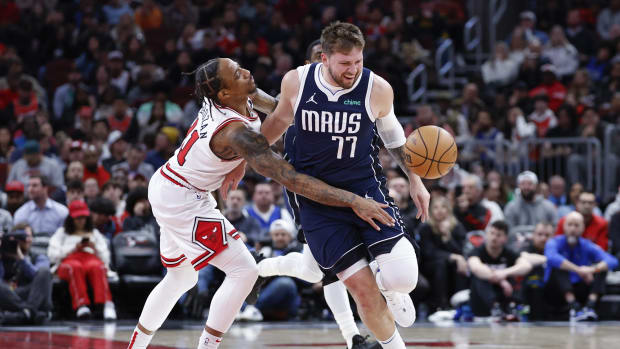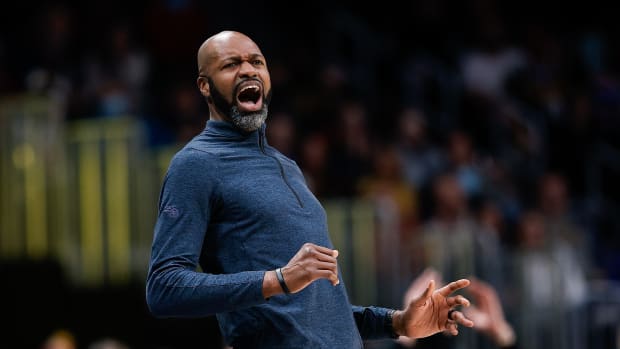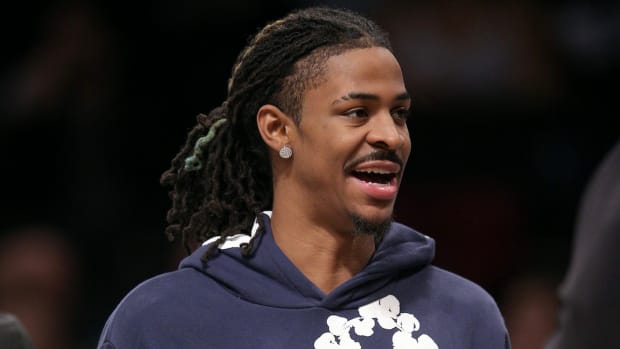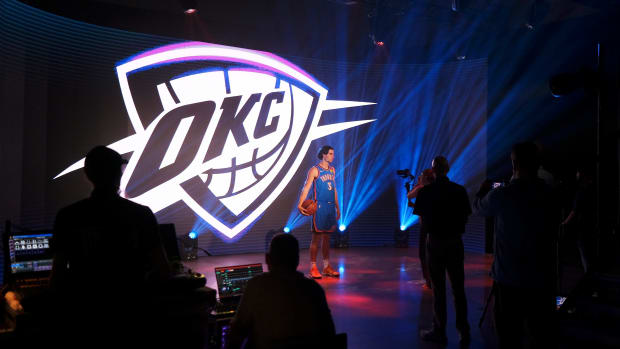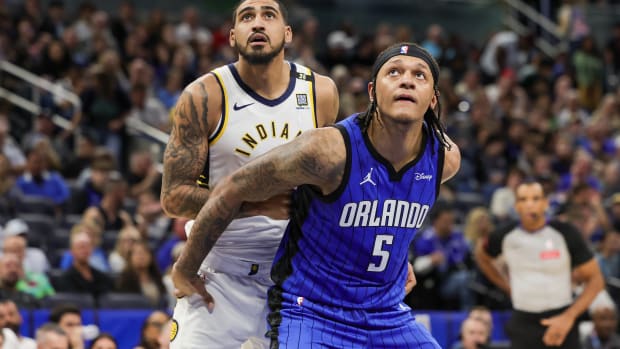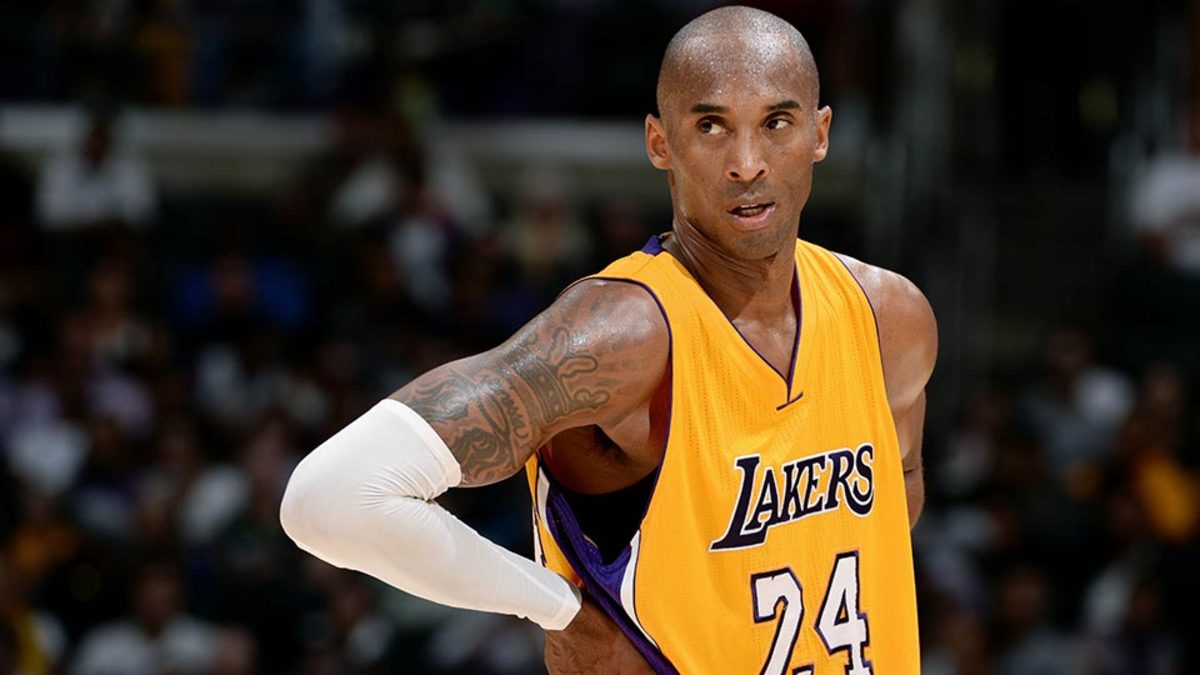
Lakers president: Free agents afraid to play with Kobe Bryant are 'losers'
For the last two summers, the Lakers have stood among the NBA's biggest offseason losers. In 2013, All-Star center Dwight Howard departed for Houston, leaving a massive hole that was never properly filled. This year, frontcourt mainstay Pau Gasol left for Chicago and L.A. watched premier players turned down its cap space and settle elsewhere. After pitching their flexible cap position for months before free agency opened, the Lakers' single-best signing this summer was forward Ed Davis, who averaged 5.7 points and 4.1 rebounds last season and signed a paltry two-year, $2 million deal. L.A.'s other biggest additions -- Julius Randle, Carlos Boozer and Jeremy Lin -- were added via the draft, the amnesty program and a trade, meaning none of the three really had any say in the matter.
This is a strange new -- and possibly temporary -- world for the decorated franchise, which has cultivated a reputation as a premier destination for star players for decades. What is causing premier players to leave L.A. and why aren't other premier players rushing to take their place?
An ESPN: The Magazine feature posits that Kobe Bryant is a leading explanation, quoting an anonymous agent about the perennial All-Star guard's impact on offseason decisions.
"I've had a lot of clients in the last five years, good players, who didn't want to play with Kobe," says an agent who has had numerous NBA stars. "They see that his teammates become the chronic public whipping boys. Anyone who could possibly challenge Kobe for the spotlight ends up becoming a pincushion for the media. Even Shaq."
Lakers president Jeanie Buss responded to the sentiment in a SportsCenter interview.
"Any free agent that would be afraid to play with Kobe Bryant is probably a loser and I'm glad they wouldn't come to the team," Buss said.
She added that the criticism of the 36-year-old Bryant's supposed role at the center of the Lakers' current struggles amounts to "jealousy and finger-pointing, excuse-making."
Pinning the Lakers' free-agent strikeouts solely on Bryant's domineering personality and sharp tongue would be a crazy over-simplification, and the ESPN: The Magazine piece certainly covered more territory than that. Likewise, writing off free agents that passed on a chance to play with Bryant, a five-time champion, for personality reasons as "losers" is a sophomoric ducking of the greater issue. Superstars seeking eight-figure annual salaries and total contracts that might run into the nine-figure range are clearly weighing more variables than whether Bryant might hit them with a "big boy pants" reference after a bad week of play.
Pacific preview: Can the Warriors overtake the Clippers for No. 1?
Among other factors, free agents will want to know how much money is available, what does the team's core look like, who stands at the top of the pecking order, what is the franchise's reputation for treating players, how desirable is the location, and what off-court opportunities will be available. The Lakers can answer some of those questions better than any other franchise. Some, but certainly not all, and Bryant's role in the unanswered questions must be acknowledged.
On the money side, L.A. is adjusting to a life under the new Collective Bargaining Agreement that strongly favors incumbent teams keeping their own free agents. The Lakers were legally unable to match the Knicks' offer to Carmelo Anthony or the Heat's offer to Chris Bosh dollar-for-dollar this summer. Asking an A-lister to settle for a four-year contract from an outside suitor instead of a five-year incumbent contract is a tough sell for anyone, even contenders, and it's proven to be an impossible sell for a Lakers roster that includes Bryant on the books for a league-high $23.5 million and holes just about everywhere else.
A free agent might reasonably ask: "Why take less money from the Lakers and not be able to compete for a title?" That's not fear of Bryant, so much as a fear of playing for a team that would be turning over a vast majority of its salary cap to two players, one of whom is closer to 40 than 30 and has spent most of the last 18 months rehabilitating. Passing on that opportunity doesn't make you a loser. It makes you intelligent.
Meanwhile, the Lakers have no "core." Bryant is the core for the next two seasons, and possibly longer if he decides to keep playing. Randle, a promising 2014 lottery pick, is the future of the team and by far the most likely player to still be on the roster in 2017. Although Nick Young signed a four-year contract this summer, it's quite possible that Randle is the only current Lakers player that will still be in town three years from now. The message that free agents take from this survey is that there is too much work to do, and that the table isn't set yet. Again, that's not fear of Bryant, that's fear of a franchise that hasn't been able to assemble quality pieces around its aging star over the last few years. Passing on what could be a multi-year building plan doesn't make you a loser. It means you have a discerning eye that can find better options.
• 2014-15 NBA preview hub | Power Rankings | Top 100 players of 2015
The "pecking order" issue is also a real one, even if it's being presented as an "ego" issue by the agent quoted above. Finding chemistry between stars is one of the trickiest things to do, and it's the primary reason why Buss's fiance, Knicks president Phil Jackson, will be remembered as one of the greatest NBA coaches of all time. When we last saw Bryant at full strength, during the 2012-13 season, he averaged 27.3 points per game and shot 20.4 times per game. Nothing about his personality suggests that we should expect him to take a radically different approach this season or next season. Nothing about the Lakers' vision -- especially the move to fire Mike D'Antoni and hire Byron Scott -- suggests the team will attempt to take a different approach this season or next. Again, asking any elite player to sacrifice alpha dog points, shots and touches is a tough sell. Asking him to do it for a non-contender is a non-starter. That's not necessarily fear of Bryant, that's a reasoned belief that one of the league's greatest scorers is unlikely to become a totally new person with a new approach to the game this late in his career. Passing on that tenuous, push-me, pull-you partnership doesn't make you a loser. It means you were paying attention during the spectacular failure of the Bryant/Howard partnership.
The cold, hard truth for Buss is that virtually every player who didn't sign with the Lakers -- even the so-called "losers" -- is likely to win more wherever they signed than they would have won in L.A. Making sure that isn't still the case next summer, and in 2016 when the salary cap is set to explode, requires that the Lakers remain completely focused on finding better answers to the questions listed above.






























